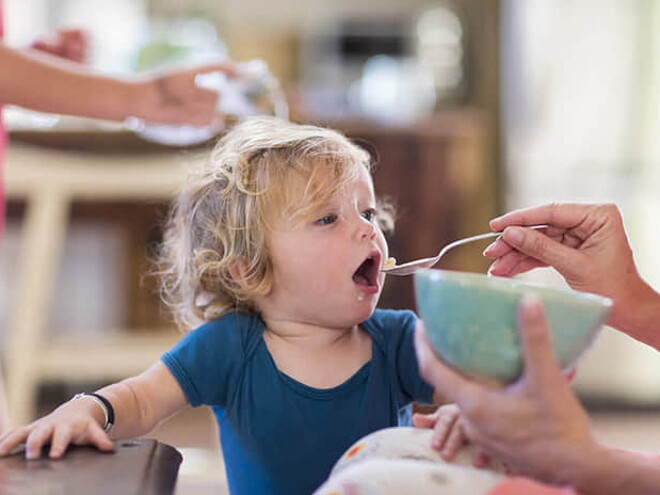
Healthy eating habits start now
Did you know? Your baby’s dietary patterns are set before his second birthday. The first two years of his life are a crucial time for establishing healthy eating patterns that can last a lifetime.
One of the best ways to maximize your baby’s chances of continuing to be a healthy eater in later years is to encourage diet variety as early as possible. Always offer your child healthy foods in a warm family environment, at meal and snack times, every day.
In some countries, less than half of 6-12-month-old babies eat vegetables each day. Even if your baby initially rejects them, keep offering fruits and vegetables to increase the likelihood he will begin to eat them more readily. Research also shows that, for some older babies, sweet foods are entering their diets at an alarming rate. If sweet foods and drinks fill your baby’s small tummy, there may not be room for healthy, nutritious foods. Show him what a healthy diet looks like. Seeing you and the rest of the family happily eating a variety of food from the five food groups—fruits, vegetables, protein foods, grains, and dairy—will help encourage him to do the same.

Respect your baby’s choices
Your little one is becoming more independent by the day. Allow him to pick up and touch his food, exploring it with all his senses. Remember the first principles of responsive feeding are that you offer a variety of healthy foods at regular meal and snack times, and your baby decides if, and how much, he chooses to eat. Pay attention to the hunger and fullness cues he shows you and never try to force him to finish the food on his plate.

Becoming an independent eater
At around 8-11 months of age, it’s likely that your baby will be able to grasp and pick up small pieces of food. This finger-feeding stage is messy and fun! It is also a crucial part of developing his motor skills and increasing his confidence and independence. Eating food with your fingers seems easy to us as adults, but for a baby there are a lot of steps he will need to learn and practice.
You may notice he is now reaching these stages:
Now… your baby is picking up small pieces of food.
Because… his ability to grip and to control his fingers is becoming more assured.
Help him by… providing appropriately sized and textured pieces of soft foods for him to practice picking up.
Now… your baby is lifting food to his mouth.
Because… your baby has enough hand-eye coordination to bring his hand to his mouth.
Help him by… showing him how you put food in your mouth. Be a role model for your baby: take a bite of food from your plate, and then encourage him to copy you by taking a bite of food from his.
Now… your baby is able to release food from his hands into his mouth.
Because… he is beginning to better understand how to feed himself.
Help him by… offering small amounts of finger foods at a time. Wait until he chews and swallows what you have offered before giving him more.
Now… he is able to fit appropriate-sized bites into his small mouth.
Because… he is learning what fits into his mouth.
Help him by… offering bite-sized pieces of soft-cooked vegetables, such as carrots, or soft fruits, such as ripe banana pieces. Choose developmentally appropriate textures and foods that are easy to pick up, like well-cooked pasta pieces. Continue to avoid any large chunks of food, and watch out for those that may present a choking risk, such as whole grapes, hard chunks of uncooked vegetables, cherry tomatoes, apple chunks or slices, hot dogs, sausages, popcorn, chunks of peanut butter, whole nuts, seeds, raisins, and candies.

Tips for successful eating
All your baby’s senses are in gear to respond to the new textures, flavors, and smells that are coming his way every day. As he gets older, your baby will become more vocal in letting you know what he wants. He’s deciding how much he’ll eat while you decide what healthy foods to offer. Here are some pointers for ensuring mealtimes are pleasant and relaxed.
- Sit down and eat with your baby at the table and make his mealtime your family’s mealtime. Children should be seated and supervised when eating.
- As your baby is still learning to manage more textures of foods, offer soft foods in small, diced pieces.
- 10-12-month-old babies still have small tummies, so it’s best to offer three meals and two snacks a day.
- Early on, your baby may begin improving his abilities to drink from a cup and handle a spoon. As he develops, he may be able to spoon-feed himself with a bit of help.
- Keep offering a variety of foods to your baby. Eating a banana a day may be good, but eating a variety of fruits, like peaches, plums, cherries, and raspberries throughout the week is more fun! If your baby doesn’t seem keen on a certain fruit or vegetable, try offering it on another day. It may take as many as eight tries for babies to accept some new foods. As always, offer only one new food to your baby at a time so you can identify if he has any intolerances.
The birthday cake question
Your baby’s first birthday is fast approaching, something all the family is sure to be looking forward to. What a milestone, you’ve been parents for a year! Time goes so quickly. You may be planning a party for him and also be invited to other babies’ birthday parties or family gatherings. So now is a good time to consider the approach you will take to the sweets or cakes that are often served at these occasions.
Special occasion foods
Research in older children shows that the more parents strongly restrict what their children can eat (such as saying certain foods are never allowed), the more likely it is that their children will overindulge in the restricted foods when given the chance. Although there is no room in a baby’s healthy diet to include daily treats and desserts, exceptions may be made for special occasion foods.
Many cultures associate certain foods with special occasions or holidays. It’s important to teach your baby that the foods offered at these festive events are not usually part of your everyday meals. These foods can be considered ‘special occasion foods’. By exposing your one-year-old baby to these types of foods in the context of celebrating, you let him know that food is part of your culture. Practice your responsive parenting feeding style by not pressuring him to eat special occasion foods. At the same time try to be relaxed about him having a taste, without praising him if he does decide to try some.
By letting him know, for instance, that birthday cake only appears when there is a birthday, the message he receives is not one of total restriction of these types of special occasion foods, but of the link between food and family or cultural events.
Portion sizes
It’s easy to overestimate the amount of food you need to give your baby. Remember he still has a small tummy and his portions will be significantly smaller than those you give yourself. Always try to maximize the nutrient value of the food you offer.


















